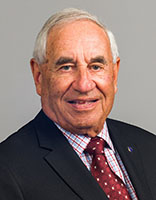MGMT Seminar by Arie Y. Lewin (Duke)
Deglobalization and Decoupling: Towards a New Order of Global Trade
Info about event
Time
Location
2610-530
Organizer

On 21 April at 11:00 - 12:00, Arie Y. Lewin, Duke University Fuqua School of Business, will give a seminar entitled "Deglobalization and Decoupling: Towards a New Order of Global Trade".
Abstract
In the past 5 years, deglobalization and decoupling have received growing attention in international business and global strategy research (e.g., Petricevic and Teece, 2019; Vertinsky et al., 2023; Witt, 2019; Witt, Lewin, Ling, and Gaur (2023); Kenney and Lewin (2022); Lewin, and Witt (2022); and Li, Lewin, Witt, and Valikangas (2021). Both of these concepts relate to decreasing levels of economic interdependence, with the world as the level of analysis for deglobalization and dyadic pairs of countries, or groups of countries, as the level of analysis for decoupling. The available empirical evidence (Witt et al., 2023) suggests that the world has been deglobalizing since around 2007. It also shows that the world’s two largest economies, China and the United States, have been decoupling since the mid-2000s. US allies may align with the United States in decoupling from China, although the economic costs may be a source of friction. Friendshoring by US companies of operations previously located in China has revealed challenges for MNEs with domestic markets in China as well as limitations on reshoring to the US. Separately the China Belt and Road Initiative (BRI) has drawn other countries closer into China’s orbit, (e.g. Africa, former states of the Soviet Union, and Latin America, Lewin and Witt, 2022). Beyond the Sino-American rivalry, Russia and the EU are competing in Africa for large scale infrastructure projects in an attempt to for greater influence. And Indian foreign policy seems torn between countering China with the help of the United States and its allies, while not alienating Russia, a Chinese ally, through increased imports of Russian oil (Witt et al., 2023). South Africa, the lead economy on the African continent, seems to be drawing closer to China and Russia. Moreover, the BRICS, have shown a newfound ability to come together for joint institution-building. Taken together, this talk explores the possibility of an economic world order that may be fragmented beyond the Sino-American bifurcation previously envisioned by Petricevic et al., (2019) and explores new opportunities for Strategy and International Business research as it affects MNEs (e.g.reshoring Industry4.0 manufacturing) and possible new institutional order for the conduct of global trade.
Short bio
Arie Y. Lewin is Professor Emeritus of Strategy and International Business, Duke University; Distinguished Visiting Professor: Fudan University School of Management, Shanghai Jiao Tong University Antai College, Fudan University, School of Economics and Management Tsinghua University, Zhejiang University School of Management, and University of International Business and Economics. Professor Lewin is the founding Editor in chief of Organization Science, past Editor in Chief of Journal of International Business Studies and of Management and Organization Review which focuses on management research in context of China and other transforming economies. Professor Lewin was the director of the Center for Business Education and Research (1995 – 2013). Professor Lewin’s research and consulting focuses on organization adaptation and change, directed co-evolution of innovation and sustaining open innovation organizations and global sourcing, in context of emerging economies especially China. He was the Lead Principal Investigator (PI), of the multi-year global Offshoring Research Network (Duke ORN) project that tracked the evolution of unbundling and dispersal of work (especially innovation activities) enabled by advances in information and communication technologies. Recent research and consulting involve case studies of open innovation at Haier, de-globalization and decoupling and emerging contest between China and the US for commanding heights of science and technology. Current major project involves China New EV industry. His book “China Innovation Challenge: Overcoming the Middle Income Trap” has been published by Cambridge University Press in 2016. The Chinese translation was published by Peking University Press. Professor Lewin is founder and co-editor of Cambridge University Press Element Series on Reinventing Capitalism https://www.cambridge.org/core/what-we-publish/elements/reinventing-capitalism
Google Citations: 27,992. Since 2018: 6482 h-index: 64; over 200 published papers in peer reviewed journals.
Everyone is welcome!